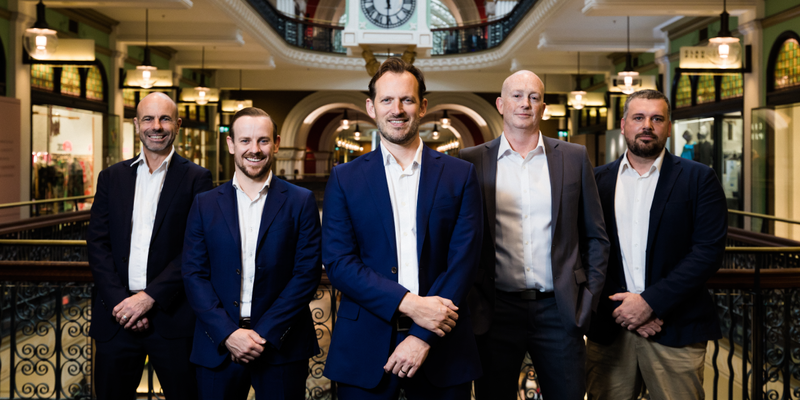
March 19, 2025
Some experts say that accountants are the future of business success. Financial strategy increasingly drives business strategy, giving organisations a foundation to grow while safeguarding their financial positions, enabling agility and getting compliant.
Leaders across the country are waking up to the added value within their accounting teams. But is your own team ready for the future, and do you have the skills in place to remain competitive?
Let’s discuss the changing role of accountants in business, and how to access the new capabilities your organisation needs.
The evolving role of accountants in business strategy
Repeated years of economic uncertainty have shown us that the true power of business is in data – financial data in particular. As cost of living remains high, global geopolitics stays volatile, regulations grow tighter and technology disrupts comfortable norms, it is finance teams who are increasingly relied upon to gather data, harness it and deliver evidence-based strategic insights.
In previous years, qualified accountants could safely specialise in a handful of core skills that were necessary to business success but narrow in their scope. However, as automation and AI take over many traditional back-office tasks, and organisational budgets remain tight, CFOs are increasingly looking to find ways for their accountants to add more value.
Technology, strategy and data science are the skills of the future accountant. Demand for manual finance roles is shrinking, and demand for strategic finance professionals proficient in areas of analytics, digital skills, operations and governance is on the rise.
Skills growing in demand
- Management accounting
- Forensic accounting
- Financial planning and analysis (FP&A), data science
- Tax strategy
- Financial statement management
- Leadership, communications and people management skills
- Digital skills – assessment, development, deployment and integration of finance systems
- International finance systems and regulatory environments
Accountants in business strategy
Modern accounting professionals must have a greater understanding of business strategy. Data analysis, forecasting and reporting all play a significant role in guiding a business through change. Leaders don’t just need data collection but data science, as it’s these next-level insights that build the justification for change, and provide the evidence to grow while staying compliant.
Accountants in governance
Risk and compliance are growing more complex, and leaders, especially of smaller organisations with fewer resources, must rely more heavily on their finance teams for support in these areas.
Mandatory climate-related financial disclosures are an example of new Australian legislation with an impact on the finance team, requiring CFOs and their accountants to upskill in ESG – for many, an entirely new and highly complex area of finance.
Good compliance also increasingly means studying international regulations, relevant to any company doing business overseas or managing an offshore team.
Finance risk and business resilience have also become one in the same, with leaders turning to finance teams for assistance safeguarding their assets. Traditional accounting and FP&A roles are combining.
What does this mean for your organisation?
In order to stay competitive in the modern age, your finance team will need to adapt.
This is a fantastic opportunity to offer career development opportunities to existing team members, though it’s likely you will also need to find new expertise to stay compliant in more complex areas of business.
But, accounting talent remains in shortage in many parts of Australia
With low national unemployment and a relatively small talent pool, it’s not easy to find the best financial talent in Australia – especially in NT and WA, where Jobs and Skills Australia shows shortages are more pronounced.*
Vacancy fill rates are at below 67% for financial roles, according to CA ANZ, highlighting the difficulty organisations are facing filling some of their most important strategic roles. There are many great finance professionals in Australia, but they aren’t moving around.
This has two consequences:
- Salary expectations are likely to rise with demand for great talent.
- It’s hard to access right-fit talent through job ads alone – wider networks and head hunting are required.
* Note: CA ANZ believes many more accounting roles are in shortage than are listed in the Occupation Shortage List, which may indicate shortages are greater than reported. See CA ANZ link above.
How to find accounting professionals with the right strategic expertise
One of the key trends of finance recruitment right now is less the shortage of great people, and more their lack of mobility. As we mentioned, Australia’s best talent is staying put, which means organisations hoping to fill gaps in their capabilities must work to find those individuals, build a relationship with them and then lure them out of their current role with a better opportunity.
It’s not easy, but with the right help it is doable. Let’s look at some tips to get you started:
1. Offer upskilling pathways
If you already have great people, consider offering new skills pathways and career opportunities. That way, you’ll help to build the talent you need while securing the loyalty of existing employees.
Plus, you already know they’re a great cultural fit for your team – because they’re already your team.
2. Audit your employee value prop
Your employee value proposition is vital to attracting high-level accounting talent. Just as you’re looking for a right-fit candidate who can fill your business requirements, they’re looking for a right-fit employer who meets their own requirements.
Some things to think about include:
- Audit your pay and benefits package to ensure it’s competitive in the modern market. If you can’t afford to pay a higher salary, consider if you can offer additional non-cash benefits. Time and again, candidates tell us that benefits are almost as, if not equally, important as pay, and we see the following as some of the most-desired benefits in Australia:
- Flexible work
- Realistic workload expectations
- Wellness programs
- Career and skills development pathways
- Great company culture
- Ensure your company culture is positive, inclusive and free of toxicity. Support your teams and reward achievements – both big and small. Your team should feel like a community, a place where people of all backgrounds feel both heard and valued.
- Focus as much on purpose as skills requirements in your job descriptions. We find modern employees increasingly want to work somewhere that aligns with their personal values, and that their role is meaningful. Nowadays, a job is more than just a job.
Learn more: Retention interviews – are they important?
3. Ensure your recruitment process is as transparent as possible
Accounting isn’t always easy, and that’s OK – everyone knows to expect certain challenges. Most professionals in the industry also realise that their skillsets need to grow, so it’s generally no surprise that CFOs are hoping to get more value out of their teams. Most professionals want this too, as it makes the job more diverse and meaningful.
The issue comes if a candidate joins your enterprise expecting one thing, only to receive another. This could be expectations around workload or hours, daily tasks, pay, culture or flexibility. You must ensure that your recruitment (and onboarding) process is fully transparent about the realities of the job, so that the only candidates who reach your business are the ones who will be happy to work there.
Learn more: Defining a role to secure top talent
4. Use a specialist recruitment partner to access wider talent pools
If you rely on job ads alone, you’re not going to find the majority of Australia’s best accounting talent – because they aren’t looking for a new role. In fact, we find that about 85% of roles here at TalentWeb are sourced through our network, not advertising.
By partnering with a specialist accounting recruiter like ours, you enable access to a much wider network of passive talent, that is, those who would be open to a good opportunity but aren’t actively searching.
Here at TalentWeb, our team of dedicated Accounting & Finance recruitment specialists have been operating in the industry for an average of 15 years. We speak your language, and can identify high-quality candidates with not only the required financial qualifications but also the additional value-adding skills that your organisation needs to grow.
To learn more about how we can help you, meet our Accounting & Finance team here, or contact us directly to talk about your business.












